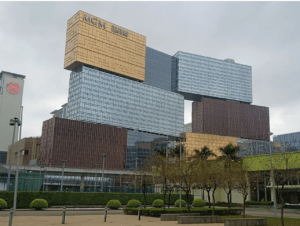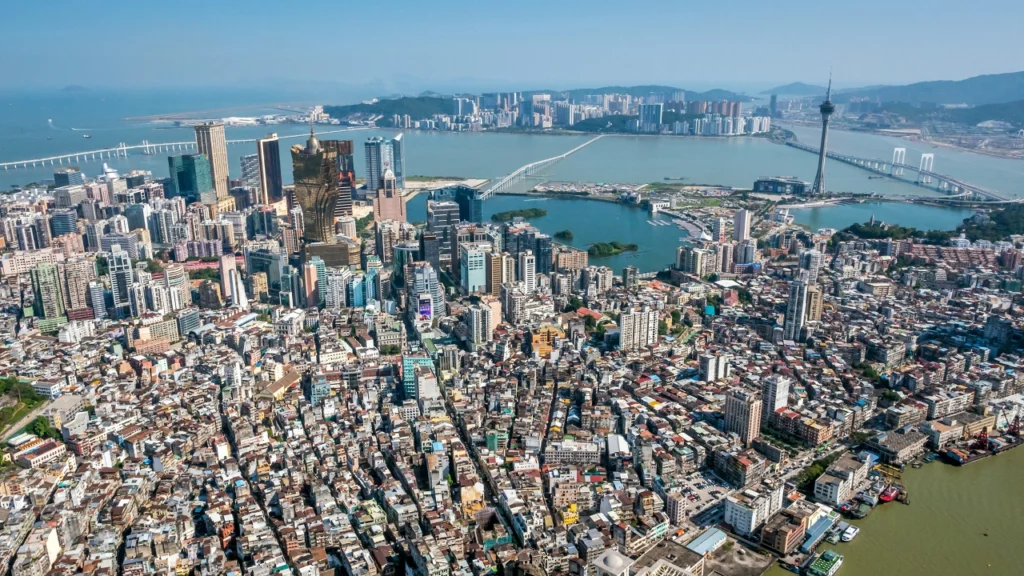The Cultural Institute (IC) admitted that it will move forward with more plans to revitalize the city’s old neighborhoods, with the next projects taking place on jetties Nos. 23 and 25 of Porto Interior, in the Avenida de Almeida Ribeiro area, the Rua de Cinco de Outubro area, the buildings in the Barra area around the D. Carlos I Dock, the Old Iec Long Panchões Factory and the Lai Chi Vun Naval Shipyards.
However, it does not advance alone. The Macau Government has the direct support of the six concessionaires in this maneuver. The Chief Executive assumed in May that the gaming operators had already delivered the revitalization projects and that “basically” there was an agreement for the six plans, with the addition of commercial elements.
According to what has been released so far, MGM China Holdings will be in charge of the Barra area around Doca D. Carlos I, Wynn Macau for Rua da Felicidade, Melco Resorts & Entertainment for jetties no. 23 and 25 of the Porto Interior and SJM Resorts on Avenida de Almeida Ribeiro. Yesterday Galaxy Macau announced that it will be responsible for the Lai Chi Vun Shipyards, so it is assumed that Sands China will be in charge of the Iec Long Panchões Factory. For now, no detailed plans have been released by these companies, or by the Government, and the cooperation model itself remains behind the scenes.
Six districts, six strategies

Urban planners and architects interviewed by PLATAFORMA ask, from now on, not to make the mistake of looking at all districts in the same way. “You cannot apply a similar strategy to everyone”, begins by saying Nuno Soares, local architect. “Concessionaires have to start by understanding these neighborhoods”, because “if they don’t make a good diagnosis, the result won’t be positive”. For this reason, he asks for calm and little haste, especially because, remember, the concessionaires are very strong in gaming and entertainment, but they do not have any type of experience in urban development. “They have to create synergies with what already exists in those neighborhoods”, he understands. “If they are too quick and rush into projects without carrying out adequate research, the results are most likely not going to be positive. Macau’s old areas have complex settings and many stakeholders.”
[The concessionaires] have to create synergies with what already exists in those neighborhoods
Nuno Soares, local architect
Furthermore, he says that “gentrification must be avoided, because instead of focusing on economic diversification, we will once again depend on a singular economy. If dealerships want to replicate their business model in these neighborhoods, we will become a ‘monoeconomy’ again.
Wallace Kwah, architect and member of the Association of Macau Heritage Ambassadors, tells our newspaper that it is necessary to define objectives clearly. If the concessionaires’ objective is simply to attract tourists and promote their brands, he warns that locations “are more attractive” when their characteristics are preserved and reinforced. “Whether they are residents or tourists, this is what they want to see most.”
Collaboration between dealerships

Nuno Soares argues that collaboration between concessionaires is essential, despite recognizing that they are not used to cooperating, in fact, quite the opposite. “They are always trying to keep customers in their properties and develop strategies so that they do not gamble with competitors.”
[The Government] may have to exercise macro control, including (…) ensuring that physical conservation and cultural export is in accordance with the characteristics of that area and whether it is appropriate to transform or combine some new elements
Wallace Kwah, architect member of the Association of Macau Heritage Ambassadors
However, he highlights that even on the Cotai Strip, where the concessionaires concentrate a large part of their properties, “they all cooperate to create the idea of a vibrant and exciting place”. Therefore, he believes that this transition can be made, always with the awareness that intervention in public space requires a different “mentality”. “Each street must feed customers from the next street and receive customers from the other.” As? “If we are talking about Rua da Felicidade, we have to be able to create synergies with Largo do Senado. And instead of just having one main axis of attraction for the Ruins of St. Paul, we can start to have another for the Inner Harbor. This is an area that, as we know, is not so well preserved.
Therefore, in this case, Rua da Felicidade needs to bring some of the attention that is already being given to the Ruins of São Paulo to the city center. But later another concessionaire will intervene in Porto Interior. Carriers are not known for collaboration as that is not their goal. But in this case, we don’t want one to succeed in the urban fabric and another to fail. We want them to come together in synergy and for this to work as a system”, he explains.
Privatization of public space

Through urban revitalization with the help of the private sector, the question arises: will there be a conflict of interests? “That’s the biggest challenge,” says Wallace. “There are not many precedents in Macau, so from the point of view of companies, which are for-profit, many issues can be seen from that perspective. In the end, it may happen that many of the processes have to be led by the Government, especially the Cultural Institute. You may have to exercise macro control, including conservation, that is, ensuring that physical conservation and cultural export is in accordance with the characteristics of that area and whether it is appropriate to transform or combine some new elements.”
It is also important that policies support incomes and the development of the night-time economy. I believe that if this vision, balance and neighborhood management policy are maintained, local companies can also benefit
Glenn McCartney, associate professor at the Faculty of Management and Integrated Resorts at the University of Macau
“There is a risk of privatization of public space”, warns Soares. Therefore, he states that “the role of the Government is fundamental”. “It must be the Government that evaluates the initiatives and protects the common good. I think a win-win situation is possible (…), but the Government is the customer.”
“This question is not that intuitive. Maybe we have to look at it from different perspectives. There may be some cultural aspects that are related to residents, and there may even be festivals and activities promoted for tourists. The opposite could also happen and, due to the large influx of visitors, these places start to have many stores such as jewelry stores and this could have a negative impact on residents”, explains Kwah.
Real estate inflation

The urban but also economic revitalization of these districts raises other issues, namely that of unfair competition, if the business of gaming operators reaches these areas. Glenn McCartney, associate professor at the Faculty of Management and Integrated Resorts at the University of Macau, believes there may be a balance point. “I’m not sure about the details of the revitalization, or what level of presence the dealerships will have – for example, whether they will have outlets/retail stores, brand presence. I think the concept is to revitalize small (family) businesses, improve visitor access (crosswalks), highlight Macau’s distinct cultural characteristics. It is important to maintain the historic character. It is also important that policies support, for example, income and the development of the night-time economy (extended opening hours, stalls, entertainment). I believe that if this vision, balance and neighborhood management policy are maintained, local companies can also benefit.”
I feel like they want mass tourism in these areas, so experiences have more to do with photos for social media or trying local food and buying souvenirs, so I don’t believe rents will increase much
Oliver Tong, executive director of JLL real estate agency in Macau and Zhuhai
There is also the potential for real estate inflation after the revitalization, namely an increase in store rents, if the influx of tourists and increased consumption materialize. Oliver Tong, executive director of real estate firm JLL in Macau and Zhuhai, has a conservative view. “I feel that they want mass tourism in these areas, so the experiences have more to do with photos for social media, trying local food and buying souvenirs, so I don’t believe that rents will increase much. On the other hand, the Inner Harbor has suffered a lot from floods and hygiene problems, meaning it will not be a suitable place to encourage commerce. In my honest opinion, it can go both ways [rents can increase or stay the same].”
Economist José Isaac Duarte says that “no one can guarantee that after an urban revitalization there will not be an increase in real estate prices”. Wallace agrees: “I believe that attracting tourists to spend money, regardless of the neighborhood (…) will have this effect, that is, it will increase prices and incomes. So this issue has to come back to the fact that maybe the whole city has to come to a consensus or an understanding about what we should actually do.”
“Rents and local businesses that are located in these areas must be monitored. The goal should be to have more local commerce, not less. There must be more public and social spaces, not less. Therefore, I think we really need to put in place some indicators that help to achieve a really positive impact on the city”, says Nuno Soares.



